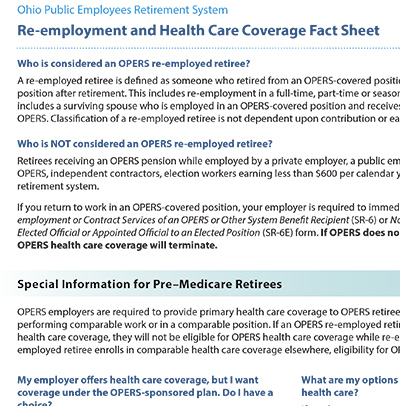Legislation Introduced to Enact Board's Recommended Changes to the COLA
While OPERS is in a strong position to continue funding benefits for current retirees and for future generations, we cannot ignore the nearly $20B in unfunded liabilities and the upcoming issues and challenges we face. By proactively assessing our fund, we can operate from a position of strength instead of waiting for a financial crisis to arise to make adjustments. That is why during its October meeting, the OPERS Board of Trustees voted on the changes to the OPERS cost-of-living adjustment which are contained in House Bill 413, introduced by Rep. Gary Scherer (R-Circleville) in November.
HB 413 does the following:
- Tying the COLA to the U.S. Consumer Price Index and capping it at 2.50 percent, beginning in 2019.
- Delaying implementation by two years for retirees who retired from Jan. 1, 2010 through Jan. 1, 2013.
- Delaying initial COLAs for future retirees until their second pension anniversary.
- Restoring 85 percent purchasing power for those retirees whose purchasing power is less than 85 percent.
- Freezing the COLA if OPERS' amortization period is at 30 years or more.
- Increasing COLA cap to 3 percent if inflation exceeds 3 percent for an extended period of time and funding measures are met.
Passage of H.B. 413 is required before any of the changes become effective.
The bill was referred to the House Aging and Long-Term Care Committee. OPERS Executive Director Karen Carraher provided testimony before the committee to explain why it was necessary to make these changes now. If the bill is voted out of the House committee, it will be sent to the House floor for a vote before moving to the Senate for consideration. We will continue to keep you updated throughout the legislative process.
For the most up-to-date news and information, visit opers.org/cola.
OPERS Board of Trustees Updates
OPERS Board Member John Maurer has Passed Away
 John Maurer
John Maurer
OPERS is saddened to announce that John Maurer, OPERS Board of Trustees member representing retirees, passed away in November.
Maurer served as an OPERS and Ohio Deferred Compensation Board member from 1991 to 1994 as an active member representative and then again from 2009 through November as a retiree member representative. He was an attorney and retired from the state of Ohio in 1996 after a career as a state hearing officer and state tax auditor. Maurer also served in the military.
As an effective and trusted Board member, Maurer served on many OPERS Board committees during his terms. He was known as a passionate advocate, especially on behalf of his fellow retirees. His diligence and expertise will be greatly missed.
Special Election
John Maurer was recently elected to another four-year term on the Board beginning Jan. 1, 2018. Since he passed away before beginning his term, OPERS retirees will elect a representative to the OPERS and Ohio Deferred Compensation Boards of Trustees in a special election process to occur in early 2018. The retiree elected will serve a term following the election through Dec. 31, 2021.
Any OPERS retiree receiving an age and service benefit, disability benefit, or benefits under the OPERS defined contribution plan is eligible to run for election. This group also includes re-employed retirees. Beneficiaries, which may include surviving family members, are not eligible to run for election or nominate candidates by signing a petition. Beneficiaries are also ineligible to vote and will not receive a ballot.
For interested candidates, nominating petition packets will be available Tuesday, Jan. 2, 2018. On or after this date, a packet can be requested by mail or by calling 1-800-222-7377. Packets will also be available at the OPERS office and will be posted on our website. Completed nominating petitions, biographical statements and certification by candidates must be received at the OPERS office to the attention of Eric Harrell no later than 4:30 p.m., Friday, Feb. 2, 2018. Petitions postmarked on or before this date, but received later, are invalid.
Ballots will be mailed to retirees in late February. All votes must be received by midnight, Friday, March 30, 2018. The final results will be certified by the office of the Ohio Secretary of State at the OPERS office Monday, April 2, 2018.
Other Board Election Results
Julie Albers will replace Sean Loftus, who did not run, as a representative for county employees. Incumbent miscellaneous employee representative Cinthia Sledz ran unopposed for her seat and will join Albers in serving four-year terms beginning Jan. 1.
Current trustees will select the representative for non-teaching college/university employees in the December 2017 meeting, with the departure of Charles Latsa from the Board. The selected candidate will serve on the Board through Dec. 31, 2018.
Thank You to Our Employer Advisory Council
We would like to thank the following members of our 2016-2017 Employer Advisory Council for another successful year:
- City of Columbus
- City of Lima
- Cuyahoga County Public Library
- Franklin County
- Kent State University
- Ohio State University
- Union County Memorial Hospital
- State of Ohio
- Delaware County
- Lawrence County
- MetroHealth Medical Center
- Hamilton County
- Fairfield Metropolitan Housing Authority
- Village of Genoa
- Muskingum County Library System
- COTA
- Great Parks of Hamilton County
- Violet Township
- Butler Township
Throughout the past two years, our EAC worked together on a number of important initiatives including the planning and executing of the Health Care Horizons Forum, providing GASB and OPEB roll out lessons learned, sharing input on revisions to employer communications and working with us to complete Employer Census Date Validations. The EAC also helped OPERS develop new educational offerings that will focus on financial wellness next year. The council played a vital role in helping us determine what types of education our members want and need by distributing employee surveys and participating in focus groups.
Thank you!
Would you like to serve on the EAC?
OPERS is looking for volunteers to serve on the Employer Advisory Council beginning in 2018 and continuing through the end of 2019. The Employer Advisory Council is not a policy-making group, rather a valuable source of feedback and input as OPERS moves forward with retirement initiatives. It's a great opportunity to represent OPERS' 3,700 reporting employers on a number of issues such as operations, new initiatives and mandated changes.
The time commitment is light, but the impact is significant. Meetings are held at OPERS two to four times a year, and there are also opportunities to provide feedback via e-mail at times. If you are interested or would like to learn more, contact Employer Services at 1-888-400-0965.
End-of-Year Reminders and Things to Know in 2018
-
Non-contributing Lists
Don't forget, Non-Contributing Lists are due Jan. 31. Please keep the following in mind when submitting your list:
- File transfer and data entry methods are available and
- You can submit more than one list provided that collectively they capture everyone
Contact Employer Services at 1-888-400-0965 for assistance when completing non-contributing lists. You can also visit the Employer Educational Opportunities page of opers.org to register for a webinar or view an online recorded presentation about how to submit Non-Contributing Lists.
Non-Contributing List Employer Webinars
-
Annual Conversion Plans
Annual Conversion Plans are due March 31. Conversion plans must be approved before any conversion payments are made if the intent is to include the payments as earnable salary. Plans cannot be retroactively approved. Plans can be submitted for review by mail, by fax at 614-857-1138, or by email at employeroutreach@opers.org. There is no need to submit an annual conversion plan for annual, sick or personal leave if you do not intend the payments to be considered earnable salary.
To learn more about the requirements for Annual Conversion Plans, visit the Employer Educational Opportunities page of opers.org to register for a webinar or view an online recorded presentation.
Annual Conversion Plans Employer Webinars:
-
2017 Personal Statement of Estimated Benefits
OPERS will begin mailing annual statements in March, so please resolve any large earnings on ECS to ensure your employees' earnings are correct. Keep in mind, W2s do not match OPERS annual statements.
-
Minimum Earnable Salary Increase
Due to changes in Ohio retirement law, the minimum earnable salary for a full month of service credit will be increasing by 5 percent in 2018, going from $630 per month to $660 per month. The minimum earnable salary for health care will remain at $1,000. There is no action required by employers and there will be no change to any reporting procedures. The changes will become effective with all Reporting Period End dates of Jan. 1, 2018 or later.
OPERS to Offer Financial Wellness Education in 2018
Over the past several months, OPERS has been researching numerous reports and studies and working with the Employer Advisory Council to gather feedback from members to help us develop educational offerings tailored to what members need and want.
Research shows a common thread among baby boomers, Gen X and Millennials – they all suffer from some kind of financial stress, whether from long-term needs such as savings and retirement plans, or short-term needs like everyday living expenses, unexpected costs and emergency medical expenses.
In an effort to address these concerns, OPERS is shifting focus and developing education that integrates retirement planning with financial wellness. Financial wellness is the knowledge of personal finance which enables healthier financial decisions to achieve one's goals, and to enhance the overall quality of life.
The goal is to provide members with hands-on, real life training so they can gain a better understanding of their personal finances and make sound financial decisions that can lead to a secure retirement in the future.
Coming in 2018, OPERS will replace the Education Today for Retirement Tomorrow seminars with new Financial Wellness Workshops that will cover a variety of topics, the first of which is called, "Bridging the Gap to Financial Wellness." The goal of this workshop is to help members assess their financial wellness, review current spending habits and estimate retirement income so they can identify the "gap" between what they will have in retirement and what they will need. The workshop will also show members ways they can begin closing their gap today.
The complete schedule of seminars can be found on the Educational Opportunities page of opers.org.
Doing More to Protect Members' Information
OPERS continually looks for ways to keep our members' personal information safe from fraud or unintentional exposure. That's why we're adding key phrases to envelopes and emails to let members know when changes have been made to their account information. Members can look for phrases such as YOUR IMMEDIATE REVIEW REQUIRED and PLEASE OPEN TO REVIEW CHANGES MADE TO YOUR ACCOUNT on the outside of mailings.
These statements will not only make members aware of unauthorized changes to their account, but also alert them to material that is time sensitive. OPERS is putting these messages in place to further protect members and retirees from scams and other fraudulent activities.
2017 Census Data Validation Complete
During the past year, 88 Employer Census Data Validations were successfully completed. Below is a summary of the findings that resulted from the validations:
- Not submitting an Annual Non-Contributing List as required by R.C. 145.036
- Inaccurate reporting on the Non-Contributing List
- Missing or outdated employer pickup plans for tax-deferred contributions
- Colleges and universities not submitting Alternative Retirement Plan Eligibility Notice (ARP-2) on ECS
- Re-employed retirees enrolled in an employer High Deductible Health Plan (HDHP)
- Re-employed retirees offered but not enrolled in employer's health care plan
- Not submitting Notice of Re-employment or Contract Services of an OPERS or Other System Benefit Recipient (SR-6)
OPERS will select 88 employers to complete Census Data Validations in 2018. If selected, employers will receive a letter this month. In addition, Employer Services is developing a membership review for smaller employers that would not be subject to a full census data validation. Stay tuned for more details.
New Accounting Rules to Impact Public Employers in 2018
As a reminder, the Governmental Accounting Standards Board (GASB) requirements implemented by employers in 2015 changed how pension liabilities are accounted for, requiring employers who file GAAP, or accrual-basis financial statements, to include a portion of the unfunded pension liability on the face of their financial statements. This is a reporting requirement – not a funding requirement.
The net pension liabilities now being placed on an employer's balance sheet do not represent the contribution obligations employers owe. Public employers are not required to fund the System beyond the statutorily required contribution rates, currently 14 percent for most employers.
Don't forget, beginning with fiscal years ending in 2018, those same employers are now required to report a proportionate share of OPERS' unfunded Other Post Employment Benefit (OPEB), or health care, liabilities.
It is important to note that not all OPERS public employers are required to report the unfunded liabilities for pension and OPEB – only those who file financial statements utilizing GAAP. GASB implemented the health care standards for the same reason as the pension standards. GASB believes pension and health care are components of the employee compensation package and the employer should report a share of the liability for the unfunded future employee benefits.
As we did with the pension standards, OPERS fought for our employers and strongly opposed the health care standards, including testifying against these standards in-person at a GASB board meeting. We told GASB how Ohio is unique and that Ohio statutes, system materials and education are clear that health care coverage is discretionary and different from pension benefits. Health care is not a promised benefit to employees.
Additionally, we told GASB the model for the management of our health care program is that we adapt the plan design and benefit structure to live within the projections of the funding available through the trust, modifying plan design if funding is projected to be insufficient. We demonstrated this practice in our operations over the past several years as we have gone through plan design changes.
We know these new standards will be material to the applicable employers. We will continue updating GASB materials posted online at opers.org to assist you in your understanding and implementation. Methodology and information provided by OPERS to employers in 2018 will be similar to the pension standards and will be available through ECS.
More information on GASB, including frequently asked questions and how these standards apply to you, can be found in the Employer section of the OPERS website.
If you have additional questions, please contact us at gasboutreach@opers.org.
Spotlight on: Heather Fullen, Ruth Morrison, Abby Chaffin, Paul Puccetti, and Michelle Richards
Compliance Specialists Heather Fullen and Ruth Morrison, and Employer Account Representatives Abby Chaffin, Paul Puccetti, and Michelle Richards have more than 50 years of combined experience at OPERS. These individuals work primarily with the state of Ohio, colleges and universities, townships and miscellaneous employers.

When calling Employer Services, be sure to enter your employer code when prompted. That way you will be connected to one of your dedicated Compliance Specialists or Employer Account Representatives.
Re-employment and Health Care Coverage Fact Sheet Now Available
The impact re-employment can have on a retiree's health care coverage can sometimes be confusing. In an effort to provide clarity OPERS created the Re-employment and Health Care Fact Sheet. You and your employees can find this tool on the Retiree Re-employment page of opers.org.
The fact sheet defines who is and who is not considered an OPERS re-employed retiree, and provides information and frequently asked questions for both pre-Medicare and Medicare-eligible retirees.

